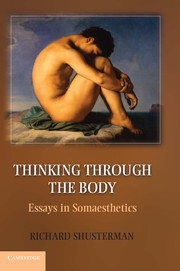Book contents
- Frontmatter
- Contents
- Preface
- Introduction
- Part I Somatic Being, Knowing, and Teaching
- Part II Somaesthetics, Aesthetics, and Culture
- Part III The Arts and the Art of Living
- 10 Somaesthetics and Architecture
- 11 Photography as Performative Process
- 12 Asian Ars Erotica and the Question of Sexual Aesthetics
- 13 Somaesthetic Awakening and the Art of Living
- 14 Somatic Style
- Select Bibliography
- Index
- References
13 - Somaesthetic Awakening and the Art of Living
Everyday Aesthetics in American Transcendentalism and Japanese Zen Practice
Published online by Cambridge University Press: 05 November 2012
- Frontmatter
- Contents
- Preface
- Introduction
- Part I Somatic Being, Knowing, and Teaching
- Part II Somaesthetics, Aesthetics, and Culture
- Part III The Arts and the Art of Living
- 10 Somaesthetics and Architecture
- 11 Photography as Performative Process
- 12 Asian Ars Erotica and the Question of Sexual Aesthetics
- 13 Somaesthetic Awakening and the Art of Living
- 14 Somatic Style
- Select Bibliography
- Index
- References
Summary
I
Why have America's most important and inspirational transcendentalist thinkers, Ralph Waldo Emerson and Henry David Thoreau, been so neglected by academic philosophy and relegated to the status of merely literary figures? One reason for this marginalization may be their advocacy that philosophy is more importantly practiced as a deliberate way of life concerned with self-improvement than as a mere academic enterprise. As Thoreau most pointedly put it, “There are nowadays professors of philosophy, but not philosophers. Yet it is admirable to profess because it was once admirable to live.” Both New England thinkers resist the restriction of philosophy to a scholastic exercise of pure intellect that is essentially confined to the reading, writing, and discussion of texts. If Emerson affirms that genuine “life is not [mere] dialectics” and that “intellectual tasting of life will not supersede muscular activity,” then Thoreau more specifically explains: “To be a philosopher is not merely to have subtle thoughts, nor even to found a school, but so to love wisdom as to live according to its dictates, a life of simplicity, independence, magnanimity, and trust. It is to solve some of the problems of life, not only theoretically, but practically” (W, 14).
This insistence on the practical dimension of philosophy was an inspiration for later pragmatists such as William James and John Dewey, whose exemplary path has guided my own efforts. While my books Pragmatist Aesthetics, Practicing Philosophy, and Performing Live offered arguments for reintegrating aesthetic principles into the ethical and practical conduct of life, these ideas were already prefigured in Emerson and Thoreau. “Art,” says Emerson, “must not be a superficial talent” of “making cripples and monsters, such as all pictures and statues are,” but must “serve the ideal” by remaking men and women of character (RWE, 437–439). Thoreau provides a still more explicit formulation: “It is something to be able to paint a particular picture, or to carve a statue, and so to make a few objects beautiful; but it is far more glorious to carve and paint the very atmosphere and medium through which we look, which morally we can do.
- Type
- Chapter
- Information
- Thinking through the BodyEssays in Somaesthetics, pp. 288 - 314Publisher: Cambridge University PressPrint publication year: 2012



